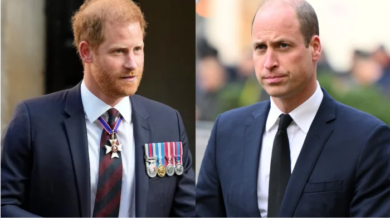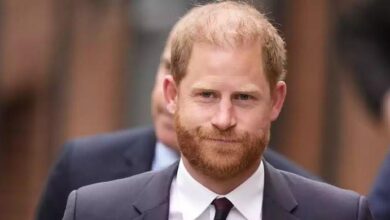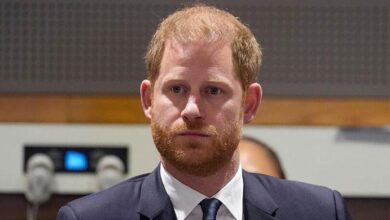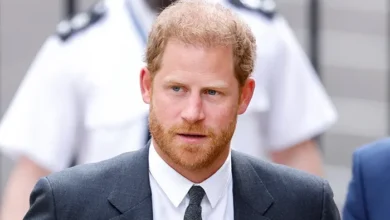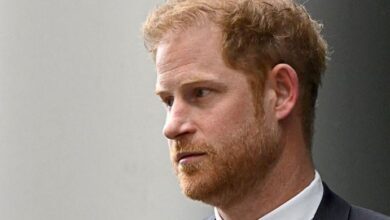Prince Harry’s Speech Sparks Debate Over American Accent Adoption in Viral Video

Prince Harry, the Duke of Sussex, has recently become the center of an online debate regarding his speech patterns. Fans and experts alike have noticed a shift in his accent, with some claiming he is adopting elements of an American accent.
This linguistic evolution, highlighted in a viral video, has stirred widespread commentary and speculation about its origins and implications.
The discussion gained momentum after a clip from a promotional event for the Invictus Games Vancouver Whistler 2025 began circulating online.
In the video, Harry, 40, was seen joking with American rapper Jelly Roll about the idea of getting a tattoo.
He used phrases like “screw it” and pronounced “ass” with an unmistakable American inflection, sparking reactions across social media platforms.
The event aimed to build excitement for the Invictus Games, where Jelly Roll is set to headline the closing ceremony.
However, Harry’s speech style inadvertently stole the spotlight, with fans and critics alike sharing their thoughts on his evolving accent.
The viral clip quickly became a trending topic on X (formerly Twitter), with users debating the degree to which Harry’s speech has shifted.
One user commented, “His British accent sounds more diluted to make way for the American accent.” Another remarked, “Living in California has clearly rubbed off on him—listen to the way he says ‘screw it.’”
Some fans saw the change as endearing, a natural reflection of his new life in the United States, while others were less enthusiastic.
Critics accused him of losing touch with his British roots, while some defended his adaptability, noting that accents often shift based on environment and close relationships.
Communication experts and linguists have weighed in on the debate, offering insights into the possible reasons behind Harry’s speech changes.
Anthony Shuster, a communication specialist, pointed out that Harry’s linguistic shift began as early as 2019, long before his permanent move to the U.S.
He cited instances of Harry softening the pronunciation of words like “little,” a hallmark of American English.
Speech pathologist Dr. Laura Henson added that accents are malleable and can evolve based on prolonged exposure to a new culture or environment. She explained:
“When someone spends a significant amount of time immersed in a different linguistic community, their accent naturally adapts to improve communication and reflect the norms of that community. Harry’s marriage to Meghan Markle, an American, and his relocation to California are strong contributing factors.”
Some experts also highlighted the role of unconscious linguistic mirroring, where individuals adjust their speech patterns to align with those around them.
This phenomenon may explain why Harry’s speech has picked up American elements after years of living in the U.S.
Read More: Prince Harry Shares Heartfelt Message as Royal Family Mourns the Loss of Beloved Companion
Since stepping down as a senior royal in 2020 and relocating to California, Prince Harry has fully embraced his new life in the U.S. He resides in Montecito, California, with his wife Meghan Markle and their two children, Archie and Lilibet.
Over the years, Harry has solidified his American ties, including renouncing his British residency in 2022.
During an interview with Good Morning America, he hinted at his long-term plans to stay in the U.S., expressing his love for the country and the opportunities it has provided for his family.
The couple has also built a brand deeply rooted in American culture through their Archewell Foundation and various media ventures, including podcasts, documentaries, and book deals.
Harry’s evolving accent may symbolize a broader cultural shift, reflecting his transition from the traditions of British royalty to the dynamic environment of modern California.
While accents are often seen as a marker of identity, Harry’s blending of British and American speech patterns could be interpreted as an attempt to bridge the gap between his heritage and his present reality.
Supporters argue that his linguistic adaptation makes him more relatable to his American audience.
“He’s just trying to fit in and connect,” one social media user noted. Others view it as a testament to his commitment to his new life, family, and community.
However, critics suggest the changes might distance him from his British roots, a sentiment echoed by royal commentators who have previously questioned his decision to step back from royal duties.
Whether the changes in Prince Harry’s speech are deliberate or incidental, they underscore his ongoing journey of self-reinvention.
As he continues to navigate life outside the royal family, Harry’s every move, including the way he speaks, remains under intense public scrutiny.
Ultimately, the evolution of his accent highlights the interplay between personal identity and environment.
For Harry, it seems, his speech is just one more way in which he is adapting to his new world—a reflection of his efforts to integrate and thrive in the culture he now calls home.

